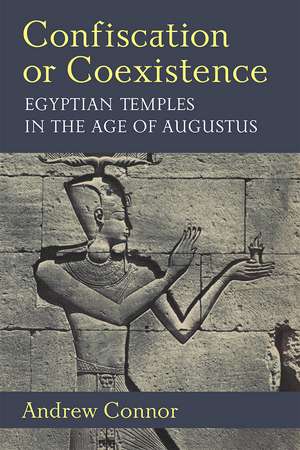Confiscation or Coexistence: Egyptian Temples in the Age of Augustus: New Texts From Ancient Cultures
Autor Dr. Andrew Connoren Limba Engleză Hardback – 24 oct 2022
It is generally accepted that Roman administrators, arriving in Egypt in the aftermath of Augustus’ annexation of the province, confiscated en masse the land and other property belonging to the temples of Egypt—estimated at as much as one-third of the country. It is further accepted that this confiscation doomed the temples by removing their economic support and making them subservient to the Roman state, and that this in turn led to the collapse of Egyptian religion. In Confiscation or Coexistence: Egyptian Temples in the Age of Augustus, author Andrew Connor takes direct issue with both claims.
The interpretative consensus developed after the publication of a handful of key documents—P.Tebt. 2.302 especially, alongside BGU 4.1198 and 1200, and P.Berl.Leihg. 1.5. Connor offers a fundamentally revised interpretation of these texts, building from a fresh examination of the papyri themselves. The book frames the interpretation in a wider discussion of Roman interactions with Egyptian religion, including material from inside and outside Egypt, and locates the development of an interpretative consensus in early 20th-century scholarship within the wider context of empire and colonization at the time. In doing so, Connor explores these papyri through their historical, intellectual, and linguistic contexts, alongside a number of other important texts bearing on the relationship between the temples and the Roman state.
The interpretative consensus developed after the publication of a handful of key documents—P.Tebt. 2.302 especially, alongside BGU 4.1198 and 1200, and P.Berl.Leihg. 1.5. Connor offers a fundamentally revised interpretation of these texts, building from a fresh examination of the papyri themselves. The book frames the interpretation in a wider discussion of Roman interactions with Egyptian religion, including material from inside and outside Egypt, and locates the development of an interpretative consensus in early 20th-century scholarship within the wider context of empire and colonization at the time. In doing so, Connor explores these papyri through their historical, intellectual, and linguistic contexts, alongside a number of other important texts bearing on the relationship between the temples and the Roman state.
Preț: 449.73 lei
Preț vechi: 555.22 lei
-19% Nou
Puncte Express: 675
Preț estimativ în valută:
86.08€ • 88.71$ • 72.67£
86.08€ • 88.71$ • 72.67£
Carte indisponibilă temporar
Doresc să fiu notificat când acest titlu va fi disponibil:
Se trimite...
Preluare comenzi: 021 569.72.76
Specificații
ISBN-13: 9780472133222
ISBN-10: 0472133225
Pagini: 238
Ilustrații: 5 illustrations
Dimensiuni: 152 x 229 x 20 mm
Greutate: 0.43 kg
Editura: UNIVERSITY OF MICHIGAN PRESS
Colecția University of Michigan Press
Seria New Texts From Ancient Cultures
ISBN-10: 0472133225
Pagini: 238
Ilustrații: 5 illustrations
Dimensiuni: 152 x 229 x 20 mm
Greutate: 0.43 kg
Editura: UNIVERSITY OF MICHIGAN PRESS
Colecția University of Michigan Press
Seria New Texts From Ancient Cultures
Notă biografică
Andrew Connor is Lecturer in Ancient History at Monash University, Melbourne.
Cuprins
Table of Contents
Acknowledgments
Chapter 1: Introduction
PART I: CONTEXTS
Chapter 2 Bastards and the Temple: Legitimacy and Rhetoric in Priestly Petitions
Chapter 3 Crocodile Tears: A Rhetoric of Loss and of Chaos
Chapter 4 “No one can claim the priestly land”:
Land, disputes, and a new interpretation
PART II: BARKING ANUBIS
Chapter 5 Motivations and Confiscations: Religious control in context
Chapter 6 Unforeseen Consequences: Confiscation in practice
Chapter 7 “Tear the monument of such a monster to pieces”:
Creating a modern confiscation
Appendix: P.Tebt. 2.302: Text(s) and Translation
Bibliography
Index of sources
General index
Acknowledgments
Chapter 1: Introduction
PART I: CONTEXTS
Chapter 2 Bastards and the Temple: Legitimacy and Rhetoric in Priestly Petitions
Chapter 3 Crocodile Tears: A Rhetoric of Loss and of Chaos
Chapter 4 “No one can claim the priestly land”:
Land, disputes, and a new interpretation
PART II: BARKING ANUBIS
Chapter 5 Motivations and Confiscations: Religious control in context
Chapter 6 Unforeseen Consequences: Confiscation in practice
Chapter 7 “Tear the monument of such a monster to pieces”:
Creating a modern confiscation
Appendix: P.Tebt. 2.302: Text(s) and Translation
Bibliography
Index of sources
General index
Recenzii
"Andrew Connor is careful, methodical, and thorough as he reexamines the accepted history that temple property in Egypt was widely confiscated throughout Egypt by the Roman imperial powers. ...A superb example of historical research at its best.”
"Connor's monograph is, in sum, a masterful work of ancient (revisionary) history that will interest classicists, historians, and scholars of ancient Mediterranean religion(s) at large."
"Connor's carefully researched book provides a fresh understanding of the key document and its property dispute, which does not attest province-wide policy, but a localized quarrel. By explaining in detail why he is refuting the confiscation narrative, he has contributed a vital basis for further interdisciplinary explorations of Roman Egypt."
"The logic of these arguments is compelling, and historians of Roman Egypt should certainly discard any illusions of a wholesale confiscation (or reappropriation) of temple land under Augustus."
"Connor's monograph is, in sum, a masterful work of ancient (revisionary) history that will interest classicists, historians, and scholars of ancient Mediterranean religion(s) at large."
"Connor's carefully researched book provides a fresh understanding of the key document and its property dispute, which does not attest province-wide policy, but a localized quarrel. By explaining in detail why he is refuting the confiscation narrative, he has contributed a vital basis for further interdisciplinary explorations of Roman Egypt."
"The logic of these arguments is compelling, and historians of Roman Egypt should certainly discard any illusions of a wholesale confiscation (or reappropriation) of temple land under Augustus."
Descriere
A new interpretation of the administrative restructuring of lands held by temples in Roman Egypt






